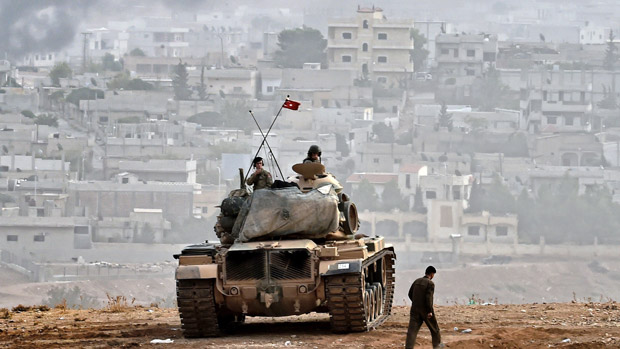Turkey lets US strike Islamic State from its bases
The commitment from Ankara 'marks a breakthrough' for Washington as heavy fighting continues in Kobane

A free daily email with the biggest news stories of the day – and the best features from TheWeek.com
You are now subscribed
Your newsletter sign-up was successful
Turkey has given the US permission to launch air strikes against Islamic State from air bases in its territory, according to US defence officials.
President Obama's national security advisor Susan Rice told NBC that the US government welcomed the commitment, saying that Ankara would now play "an important role" in the fight against IS.
She confirmed that Turkey has now agreed to let US forces to use the bases "to train moderate Syrian opposition forces" and "engage in activities inside of Iraq and Syria".
The Week
Escape your echo chamber. Get the facts behind the news, plus analysis from multiple perspectives.

Sign up for The Week's Free Newsletters
From our morning news briefing to a weekly Good News Newsletter, get the best of The Week delivered directly to your inbox.
From our morning news briefing to a weekly Good News Newsletter, get the best of The Week delivered directly to your inbox.
The CIA has been running a "train-and-equip" programme for hand-picked Syrian rebels since last year, which until now has been based in Saudi Arabia. One of the bases used for training and air strikes is expected to be the Incirlik Air Base situated in the south of the country, within 100 miles from the Syrian border.
Turkey has previously been criticised for failing to take action against IS militants, particularly in the key border town of Kobane.
"The move marks a breakthrough for Washington," according to The Times, following increasing pressure on Turkey to play a larger role in the fight against IS, due to its key geographical location.
While Turkey has deployed some troops to the Syrian border, it has refused to launch a ground offensive in either Syria or Iraq and has also stopped Kurdish fighters living in the country from crossing the border to fight.
A free daily email with the biggest news stories of the day – and the best features from TheWeek.com
Part of Turkey's reluctance to join the fight against Islamic State is due to concerns about arming its Kurdish population, against which it fought a long civil war, the BBC reports.
US defence officials are "continuing to talk to the Turks about other ways that they can play an important role", said Rice. "They are already essential to trying to prevent the flow of foreign fighters," she explained.
Meanwhile, heavy fighting between Kurdish forces and IS militants continues in Kobane, with neither side gaining ground, Ocalan Iso, deputy head of the Kobani defence council told The Guardian.
-
 6 exquisite homes with vast acreage
6 exquisite homes with vast acreageFeature Featuring an off-the-grid contemporary home in New Mexico and lakefront farmhouse in Massachusetts
-
 Film reviews: ‘Wuthering Heights,’ ‘Good Luck, Have Fun, Don’t Die,’ and ‘Sirat’
Film reviews: ‘Wuthering Heights,’ ‘Good Luck, Have Fun, Don’t Die,’ and ‘Sirat’Feature An inconvenient love torments a would-be couple, a gonzo time traveler seeks to save humanity from AI, and a father’s desperate search goes deeply sideways
-
 Political cartoons for February 16
Political cartoons for February 16Cartoons Monday’s political cartoons include President's Day, a valentine from the Epstein files, and more
-
 Epstein files topple law CEO, roil UK government
Epstein files topple law CEO, roil UK governmentSpeed Read Peter Mandelson, Britain’s former ambassador to the US, is caught up in the scandal
-
 Iran and US prepare to meet after skirmishes
Iran and US prepare to meet after skirmishesSpeed Read The incident comes amid heightened tensions in the Middle East
-
 Israel retrieves final hostage’s body from Gaza
Israel retrieves final hostage’s body from GazaSpeed Read The 24-year-old police officer was killed during the initial Hamas attack
-
 China’s Xi targets top general in growing purge
China’s Xi targets top general in growing purgeSpeed Read Zhang Youxia is being investigated over ‘grave violations’ of the law
-
 Panama and Canada are negotiating over a crucial copper mine
Panama and Canada are negotiating over a crucial copper mineIn the Spotlight Panama is set to make a final decision on the mine this summer
-
 Why Greenland’s natural resources are nearly impossible to mine
Why Greenland’s natural resources are nearly impossible to mineThe Explainer The country’s natural landscape makes the task extremely difficult
-
 Iran cuts internet as protests escalate
Iran cuts internet as protests escalateSpeed Reada Government buildings across the country have been set on fire
-
 US nabs ‘shadow’ tanker claimed by Russia
US nabs ‘shadow’ tanker claimed by RussiaSpeed Read The ship was one of two vessels seized by the US military